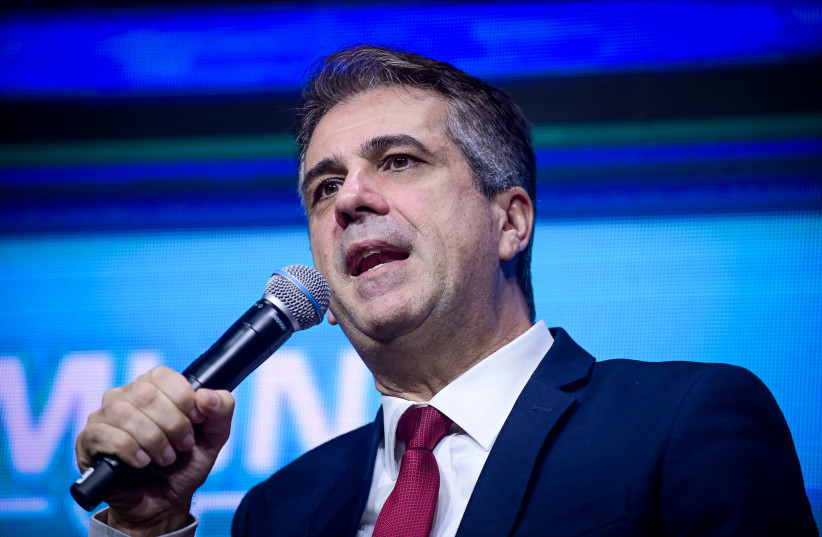Israel’s relationship with the United States is inarguably its most crucial in the diplomatic arena. Newly inaugurated Foreign Minister Eli Cohen thankfully understands that.
Cohen, in his first phone call in his position to US Secretary of State Antony Blinken said it plainly, emphasizing that Israel’s relationship with the United States and its maintenance is a top strategic priority.
Blinken is the key man standing at the forefront of Israel and the US’ ongoing diplomatic communications and the voice of the Biden administration when it comes to foreign policy, and Cohen told him what he was undoubtedly hoping to hear, amid trepidations about Israel’s new government.
“I told him the strategic relationship with the US is our top priority and that we will continue to strengthen the special bond between the two countries.”
Eli Cohen
“I told him the strategic relationship with the US is our top priority and that we will continue to strengthen the special bond between the two countries,” Cohen said shortly after their call.
Blinken added platitudes about “the United States’ abiding commitment to the US-Israel partnership and to Israel’s security.”

Cohen further said that they had spoken “about the importance of expanding the Abraham Accords and our joint activity to prevent a nuclear Iran.”
Israel's new government is treading on eggshells with the US
Prime Minister Benjamin Netanyahu’s new government is treading on eggshells right now when it comes to the US. The hard-right policies of new members of the government like Itamar Ben-Gvir and Bezalel Smotrich clearly don’t dovetail with the Biden administration’s views on many issues affecting the region. Blinken, in his comments following the talks with Cohen, specifically mentioned the US “commitment to a two-state solution and opposition to policies that endanger its viability.”
The US is clearly concerned over rumblings about annexation in the West Bank and potential tension with the Palestinians.
Just a few days after Israelis voted in Netanyahu and his new government, Blinken told Palestinian Authority President Mahmoud Abbas that the US still supported a two-state solution and was concerned over “the situation” in the West Bank, referring to numerous terrorist attacks and back-and-forth violence between Israelis and Palestinians.
Nevertheless, Blinken made it clear just a week before the government was sworn in that the US would judge the government by its policies, not its personalities. That is to say, until legislation is set forth in direct contradiction to that which was an unbreakable line in the past from the US point of view, Israel is in the clear. This is despite having numerous members of the government stand in firm support of policies the US has deemed unacceptable, such as West Bank annexation.
This gives hope for the relations in the future, and Cohen’s comments following initial talks with Blinken only further solidify the sense that Israel has made the right moves diplomatically in just a few days. Prioritizing relations with the US is the right move tactically and should be supported and encouraged on all ends.
That being said, it is important for Israel now, more than ever, to be attentive to outside voices during a time of instability. National Security Minister Itamar Ben-Gvir’s visit to the Temple Mount on Tuesday awakened harsh responses worldwide, including from the US.
“Let it be clear – we are interested in preserving the status quo, and any action that prevents this is unacceptable.”
Tom Nides
“Let it be clear – we are interested in preserving the status quo, and any action that prevents this is unacceptable,” US Ambassador to Israel Tom Nides told Walla News shortly thereafter. “We said this clearly to the Israeli government.”
According to Nides, the visit was a direct violation of the trust and understanding between the US and Israel.
Coming so soon after the installation of the new government, Ben-Gvir’s visit to the Temple Mount will not ingratiate Israel’s new government with the US.
Netanyahu and Ben-Gvir met on Monday evening, after which the Likud put out a statement saying, “After consulting with security officials, Netanyahu did not request that Ben-Gvir not visit the site.”
“After consulting with security officials, Netanyahu did not request that Ben-Gvir not visit the site.”
Likud
That somewhat lukewarm reaction shows how Netanyahu is attempting to tread the thin line between trying to appear strong to his right-wing constituency, yet appearing diplomatic to the US and the rest of Israel’s Western allies.
If there is any advice to give to the new Israeli government, it is this: Be careful. The US-Israel relationship takes priority over other ties. Take each step cautiously, and act on Eli Cohen’s words.
